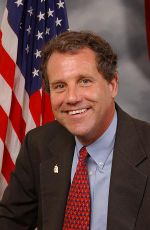Sherrod Brown 

Sherrod Brown (born November 9, 1952), of Avon, Ohio is an American politician who serves as a U.S. representative from the Democratic party, representing the 13th congressional district of Ohio.
Brown was born in Mansfield, Ohio. He became an Eagle Scout in 1967. He received a bachelor of arts degree in Russian studies from Yale University (New Haven, Connecticut) in 1974 and a master of arts degree in education and public administration from Ohio State University (Columbus, Ohio) in 1981. He taught at the Mansfield branch campus of Ohio State University from 1979 to 1981.
He is the Democratic candidate for the United States Senate seat currently held by Mike Dewine.
Career in politics
State politics
Brown served as an Ohio state representative from 1975 to 1982. He was one of the youngest state representatives in Ohio history, and supposedly, shortly after taking office, he was mistaken for an intern and asked to fetch coffee by a staffer. In 1982, he won a four-way Democratic primary that included Dennis Kucinich, now a Cleveland Congressman, then defeated Republican Virgil E. Brown in the general election for the office of Ohio Secretary of State, succeeding Anthony J. Celebrezze Jr.. In 1986, Brown won re-election as secretary of state, defeating Vincent C. Campanella. In 1990, Brown lost when trying for a third term as secretary of state to Republican Bob Taft.
U.S. House of Representatives
In 1992, Brown ran for a seat in the United States House of Representatives and won. He began serving in 1993 (103rd Congress).
Brown was an Ohio delegate to the 2000 Democratic National Convention. He was an unpledged delegate to the 2004 Democratic National Convention in Boston.
Brown is the ranking minority member on the House Energy and Commerce Committee's Health Subcommittee. He also serves on the Subcommittee on Telecommunications and the Internet and the Subcommittee on Commerce, Trade and Consumer Protection. A member of the House International Relations Committee, he also serves on the Subcommittee on Asia and the Pacific.
Brown, relatively young and telegenic, is considered one the stars of the Ohio Democratic Party. In 2001, when the Republican-controlled legislature threatened to gerrymander him out of office, Brown threatened to run for governor in 2002. The Republicans backed down, preserving Brown's majority Democratic district, and Brown stayed in the U.S. House of Representatives.
In 2005, Brown led the Democratic effort to block the Central American Free Trade Agreement (CAFTA). For many months, Brown worked as whip on the issue, securing Democratic "nay" votes and seeking Republican allies. After several delays, the House of Representatives finally voted on CAFTA after midnight on July 28, 2005. Keeping the roll call open well past the 15 minute standard, the House approved CAFTA by a vote of 217 to 215. CAFTA effectively passed by one vote - a tie would have resulted in a defeat.
Brown cites this stinging outcome as the impetus for the next stage of his career: running for the U.S. Senate.
Senate campaign
Main article: Ohio United States Senate election, 2006
In the summer of 2005, Brown announced he would not run for the United States Senate seat held by Republican Mike DeWine. [1] That fall, however, Brown reconsidered his decision to enter the ring. [2] This announcement came shortly after Democrat Paul Hackett also stated that he would soon announce his candidacy. Within Ohio, Brown's decades of involvement in Ohio politics, including his years in statewide office, have given him high name recognition amongst Ohioans and a considerable fundraising advantage. In addition to his Senate campaign, Brown also helped to support Reform Ohio Now to promote several state jurisdictional changes on the ballot in November 2005.
On February 13, 2006, Hackett withdrew from the race, all but ensuring that Brown would win the Democratic nomination. In the May 2 primary, Brown won 78.05% of the Democratic vote. His opponent, Merrill Samuel Keiser, Jr., received 21.95% of the vote.
Brown will face two-term incumbent senator Mike DeWine in the November general election.
Family
Brown's wife, Connie Schultz, is a Pulitzer Prize-winning columnist on leave from Cleveland's Plain Dealer newspaper. Brown's daughter Emily works for the Service Employees International Union. His daughter Elizabeth and stepdaughter Caitlin are both college students. His stepson Andrew Gard is a doctoral student at Ohio State University. Brown and his family are Lutherans.
Trivia
Brown was the target of a misunderstanding by Rush Limbaugh on his radio program on February 14, 2006. Commenting on Hackett's withdrawal from the Senate race the previous day, Limbaugh declared there was a racial element to that withdrawal, making that statement on the erroneus assumption that Brown was black. ("Sherrod" is perceived as a more common African-American name than Caucasian name). He was corrected and withdrew his statement later in the same program.
Author
Brown is the author of two books:
Congress from the Inside: Observations from the Majority and the Minority ISBN 0873386302
Myths of Free Trade: Why American Trade Policy Has Failed ISBN 1565849280



